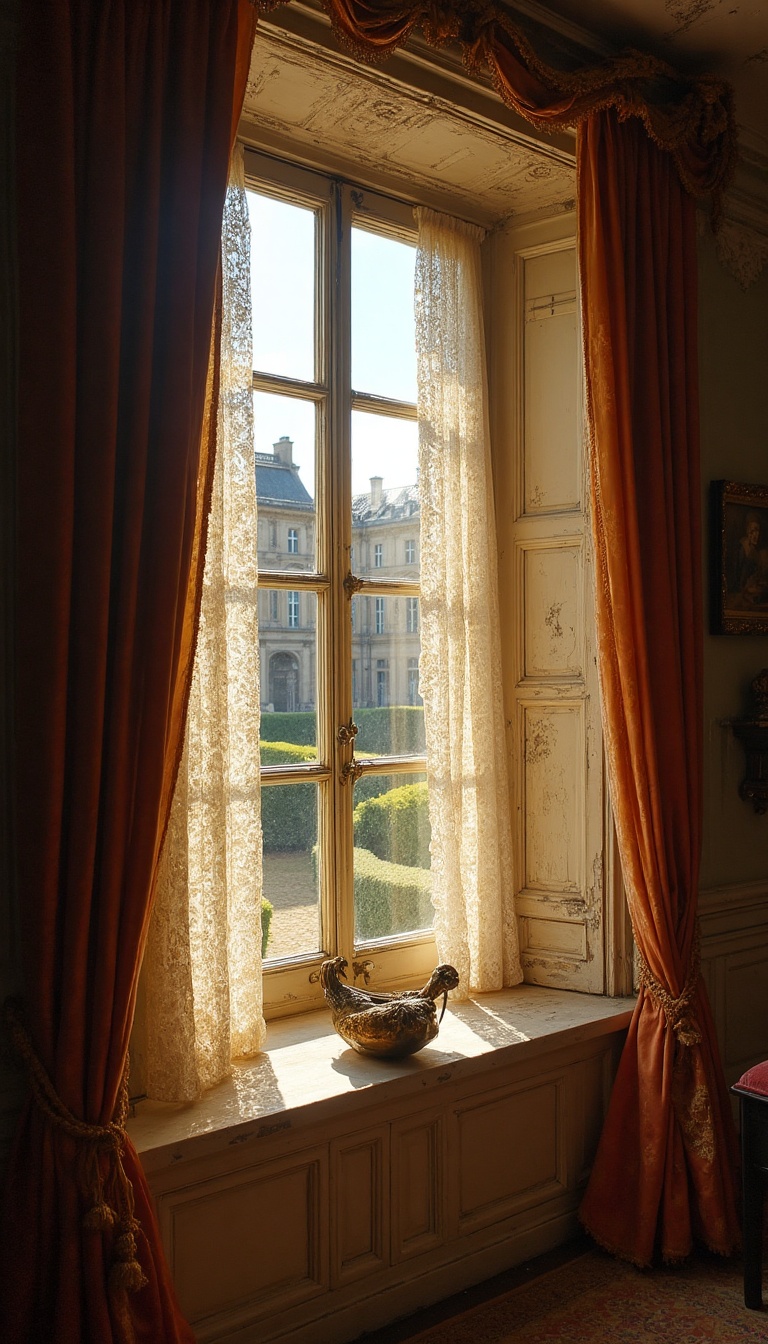In the splendid, gilded halls of the Palace of Versailles, the aroma of spices and savory delights wafted through the air like a siren’s call, guiding the nobility toward the grand dining hall. In the heart of it all was Étienne Laurent, a tall figure with the elegant build of a dancer, whose fingers moved nimbly as he arranged each culinary masterpiece. Clad in a pristine white chef's coat embroidered with golden thread, he wore a black velvet waistcoat and trousers that accentuated his athletic form. His dark hair was pulled back into a neat queue, revealing deep-set brown eyes that twinkled with a spark of ambition and mischief.
As he plated a delicate lavender soufflé, Étienne’s mind wandered to his past. He had risen from humble beginnings in a small village near Bordeaux, impressed by the culinary talents of his mother, who had once fed the town with her hearty stews. But the ambition that drove him here was not just food; it was glory, a rebirth shaped by every ingredient and every dish. Yet, lurking beneath the surface was an ecological order, a realm threatened by the nefarious scheming of the brutal Count Gaspar de Montfort, a man with a reputation as sharp as his tongue and a hunger for absolute power.
The court had seen many colorful personalities, but none piqued Étienne’s interest as profoundly as the women who frequented the banquet halls. The first was Geneviève, the enchanting daughter of a nobleman, whose sapphire eyes sparkled mischievously. Her raven-black hair fell in flowing waves, framing a visage that shone with youthful exuberance. Often seen wearing a deep indigo gown that accentuated her hourglass figure, she laughed with a gentle confidence that entranced the young master chef, though her heart was claimed by another.
Then there was Marguerite, the sultry, fiery beauty known for her daring spirit. With flaming red hair cascading over her shoulders and emerald eyes that blazed with intensity, she wore a striking crimson dress that clung to her curves. Her laughter echoed like a chorus of mischief in his ears, each jest tinted with charm. Yet, Marguerite was often feuding with the court’s elite, always seeking adventure, and found herself embroiled in intrigues that dragged Étienne closer to danger.
Étienne remembered Léa, the third enchanting woman—a kind soul with a heart of gold who worked tirelessly to protect the village's humble resources from the greedy claws of the elite. Her deep brown hair, often braided, danced around her shoulders. Her gentle hazel eyes radiated warmth and compassion, capable of softening even the most hardened hearts. Clad in a modest yet elegantly fitted green gown, she was an advocate for the underprivileged, and her fierce determination had ignited a powerful chemistry with Étienne. She often encouraged him to use his craft to uplift the city rather than bow to the whims of the elite.
But the final woman who would change everything was the ethereal Juliette, adorned with shimmering golden locks and azure eyes that seemed to encompass the beauty of the universe. Wearing a flowing gown that accentuated her delicate curves, she entered the court like a vision. Each smile felt like a promise, each glance igniting an unexpected passion. It was amidst the tension and turmoil of the court that Étienne found something he had long sought but never dared to grasp: genuine connection.
Yet, as the court celebrated a sumptuous feast, shadows cast by treachery darkened the hall. Count Gaspar, having set his sights on Étienne’s culinary fame, devised a sinister plot—the destruction of Étienne's stall and the silencing of any dissent against his authority. With whispers of betrayal galloping through the air, Étienne's creations turned from artistry to survival.
The next day, in the exclusive kitchens of Versailles, Étienne faced his ultimate challenge as a mysterious affliction began to plague the noble’s banquet—sudden illness that seemed to stem from his own delicious dishes. A series of misfortunes led to whispered accusations directed against him, and the beautiful women in his life soon became pawns in Gaspar’s destructive game.
As Étienne plotted to clear his name and save his beloved culinary triumphs, Geneviève and Marguerite formed an unlikely alliance, determined to uncover the heart of the matter. Ésteem because of his status and burgeoning fame, Geneviève adeptly flitted through the court’s intrigues while Marguerite’s bold escapades provided cover for Étienne's much-needed investigations.
Days passed, and sensible Léa, choosing hope and belief over despair, rallied the common folk to gather evidence and protect Étienne’s honor, creating bonds within the city that even the Count could not disturb. But when betrayal came from an unexpected corner—one of Étienne’s former apprentices influenced by Gaspar—everything shifted toward chaos.
Fueled by desperation, Étienne found himself at the clandestine meeting with Juliette under the arches of Versailles, where the moonlight illuminated her features. “This battle is not only yours, Étienne,” she whispered, her voice trembling with an emotion that sparked like wildfire, “but ours. We are a part of this story, our community our strength.”
On the eve of the grand banquet, the stage was set for a confrontation. All eyes were on Étienne’s final dish, set to unveil a recipe that could change the tides of loyalty within Versailles. The courtyard brimmed with tense anticipation as Geneviève, Marguerite, and Léa put the final pieces of evidence against Gaspar into motion.
As Étienne plated the meal—a dish crafted from fresh herbs and wild game—Gaspar struck like a snake, drawing weapons hidden beneath his sumptuous attire. “It will be your head that rolls if this dish fails!” he hissed.
But Étienne stood undeterred, facing his nemesis. As the tension escalated, Marguerite hurled accusations while Geneviève revealed betrayals with an elegance that left the Count without words. With the court in disbelief, Léa unveiled the connections between Gaspar and the ancien royalty in the community, spinning an elaborate web that exposed the dark underbelly of his ambitions.
In one final surge of passion and defiance, Étienne served the dish, invoking memories of his mother’s recipes tinged with risky culinary adventures. The banquet erupted into a raucous symphony of flavor that courted joyous applause and, with gasps of shock, Gaspar's plot was unspooled before them.
In the aftermath, the air thick with liberation, Étienne found warmth not only in the cheers but in the arms of Juliette. Their connection flourished in the chaos, a new flavor intermingling as they reveled in the freedom of expression, camaraderie, and shared ambition. Love bloomed like spring flowers in the midst of winter, defying the frost of betrayal.
And so, in the sun-soaked splendor of Versailles, beneath lavish chandeliers and the laughter of noble patrons, Étienne Laurent not only cemented his culinary legacy but also ignited a passionate revolution of heart and honor — proving that even in the courts of absolute power, love and determination could rise above treachery, forging bonds that flourished against all odds.
Disclaimer: This article may contain affiliate links. If you click on these links and make a purchase, we may receive a commission at no additional cost to you. Our recommendations and reviews are always independent and objective, aiming to provide you with the best information and resources.
Get Exclusive Stories, Photos, Art & Offers - Subscribe Today!
























Post Comment
You must be logged in to post a comment.